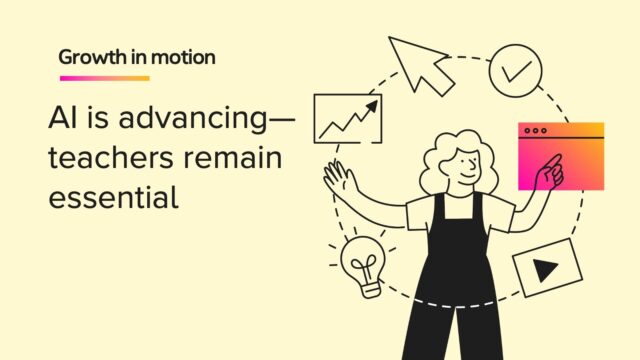
Welcome back to Teachers in America, where we connect with real educators and ed leaders to provide practical instructional tips and talk about the latest teaching trends to help you stay on the forefront of what’s new in education.
Today we introduce Ed Trends minisodes, bite-sized episodes that explore the latest trends in education. In our first minisode, host Kailey Rhodes digs into the 2024 Educator Confidence Report (ECR). HMH, in partnership with MarketCast, conducted this report to spotlight educators’ views on issues that impact them daily, such as emerging tech. Hear insights on teacher concerns and trends in education.
A full transcript of the episode appears below; it has been edited for clarity.
You can follow Teachers in America wherever you listen to podcasts. Subscribe on Apple Podcasts, Spotify, Google Podcasts, Stitcher, or iHeartRadio.
Please consider rating, reviewing, and sharing Teachers in America with your network. We value our listeners' support and feedback. Email us at shaped@hmhco.com.
The views expressed in this podcast are those of the guest and do not necessarily represent those of HMH.
2024 Educator Confidence Report: Insights on teacher concerns and trends in education
Kailey Rhodes: Hi I’m Kailey Rhodes! And this season on Teachers in America, we’re introducing Ed Trends minisodes. These bite-size episodes will keep you informed of the latest issues impacting education. Today, I’m going to break down HMH’s latest survey of educators, zeroing in on teachers’ top concerns, their view of the profession, and what can make it better. Let’s get into it!
This year marks the 10th anniversary of HMH’s Educator Confidence Report, conducted in partnership with research firm MarketCast. Every year for the past 10 years, we’ve been checking in with educators about the issues that impact them daily and asking them how we can improve the profession going forward. So let's hit some highlights.
Let’s start with the Educator Confidence Index, which measures educators’ views of the profession on a scale of 0-100. Sound familiar, teachers? In the 10 years that HMH has been conducting this survey, sentiment toward the profession has remained fairly low, with small increases and dips along the way.
This year, educators’ outlook is on a slight upswing, from a historic low of 40 in 2022 on a scale of 0–100, to 42 in 2023, and 43.6 this year in 2024. These numbers, while slowly increasing, do show room to grow.

Why do educators give the profession such a low grade? Our survey spotlights their top concerns. Number one: Low teacher salaries. Teachers, we understand this one. Followed closely by number two: Educators' mental health. So important; just as important as number three: Students' mental health. Number four: Lack of education funding. And finally, number five: Students' social and emotional needs.
Low salaries have long been a concern in the teaching profession, even before we introduced it as a topic in the survey in 2018. We as educators understand that one. And if you’re outside the field, you’ve likely seen news articles about how teachers in some states have to work a second job or have a side hustle to make ends meet.
Educators have also said burnout is a critical issue, so it’s no surprise that concern over their own mental health also tops the list. If our educators aren't happy and aren't healthy, they're not going to get those results in the classroom and they may not stay. Educator have told us they’re always "on" during the day, and often spend nights and weekends preparing lessons instead of resting up and recuperating. And a balanced workload would really help here, according to 82% of respondents. That’s a significant percentage.
Two of these issues are mostly out of a principal’s control: low teacher salaries and lack of funding are unfortunately not something our administrators can directly address.
But student and teacher mental health and social emotional learning (or SEL) are things a principal can impact. Teachers need to be served by a great principal to help them do the job effectively. As a teacher myself, I’ve seen this firsthand.
We know that principal that leans into our health and wellbeing can make or break it for us. There’s support for principals at the Center for Model Schools, established by HMH to address the challenges in education today. The Center focuses on five key ingredients. These are essential elements to making sure that every child is in the model school they deserve. Decades of research from the University of Chicago Consortium on School Research, or “UChicago Consortium”, identified these five essential factors of schools that improve student outcomes. So number one, you’ve got to have an effective leader. You have to have collaboration among your staff. It needs to feel like a team. Your families need to be really involved in the school because the school is a bigger community than just inside the walls. You need ambitious instruction, high standards for all kids and, finally, you need a supportive environment. When leaders focus on these elements, they get better results. And teachers tend to stay at these schools and do great work.
The ingredients for a successful school culture are really ingredients for any successful culture in any community. But, as with most things that are utopian, this is a tall order. So how do you accomplish this? Well, the great news is that we’ve got resources to get you started. Look for the links to a great read on our blog for educators with practical steps for leaders on building supportive environments and a webinar on maximizing your team’s collective wisdom to create a framework for rapid change.
So, let’s get back into the report. This year’s findings show that educators are less likely to leave the profession than they were 10 years ago, which is great. But many still say they haven’t ruled it out. In fact, only 33%, or a third of respondents say they have no interest in leaving. Teacher retention has long been an issue for the profession. And principals of schools with high teacher turnover often have no other choice but to hire inexperienced teachers to fill vacancies. Hiring and training new teachers is expensive. And too much turnover is never good for school culture. How can that culture take root if everything around it is in constant flux?
Educators responding to our survey have ideas about what might attract teachers to the profession and make them want to stay. And teachers, these answers won’t surprise us. First, 82% said improved salary and benefits. We need to be having those standards of living and those security measures met for us to be enjoying our profession. 58% said adequate funding for classroom supplies and resources. That's a big one. We want to make sure that we do our jobs and we do it well. And 53% said support for well-being and physical health, which anyone whose not in the teaching profession can also agree that their own workplace would be improved by those things.
So, we just touched on this, but it bears repeating: leaders can increase retention by creating better school culture. Culture keeps educators at a school, or it drives them away. So keep building toward those five components of a model school that we talked about earlier: effective leaders; collaboration among staff; involved families; ambitious instruction; and a supportive environment.
Teachers, we can agree that in the best schools that we've had the pleasure of teaching, the ingredients that make up that experience are leadership that makes sure all staff, not just teachers, are involved in decision making and owning the vision. They feel like a true team. It feels like everyone has an equal voice. It's all about dismantling that hierarchy and making sure that we all feel like we own the plan. They didn't just tell teachers to meet a standard without providing needed support. We would never tell students to meet a standard without providing them support. So, we should never do that to our teachers. And, finally, these schools worked on building trust and had trust built into their day. Leaders did what they said they were going to do in a transparent way, and if something went wrong, they addressed it. This is the kind of culture we all want to work in.
Looking ahead to future episodes, well talk about while educators’ concerns about the profession point to systemwide challenges, their responses to survey questions about AI in the classroom may be cause for cautious optimism. Teachers agree that emerging technologies like generative AI can be a potential tool for battling burnout by giving them time, time back to do what they do best—connect with students in a meaningful way. We’ll dig into educators’ views of AI in our future Ed Trends minisode. Thanks for tuning in!
Jenn Corujo: If you or some you know, would like to be a guest on the Teachers in America podcast, please email us at shaped@hmhco.com. Be the first to hear new episodes of Teachers in America by subscribing on Apple Podcast, Spotify, or wherever you get your podcasts. If you enjoyed today’s show, please rate, review, and share it with your network. You can find the transcript of this episode on our Shaped blog by visiting hmhco.com/shaped. The link is in the show notes.
The Teachers in America podcast is a production of HMH. Thank you to the production team of Christine Condon, Tim Lee, Jennifer Corujo, Mio Frye, Thomas Velazquez. and Matt Howell. Thanks again for listening.
***
Hear new episodes of Teachers in America on Shaped, Apple Podcasts, Spotify, or wherever you listen to podcasts.
Get the ECR to see all the survey results.













